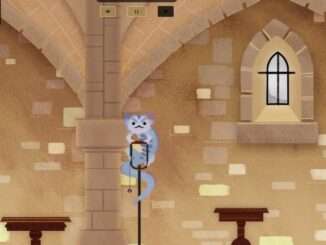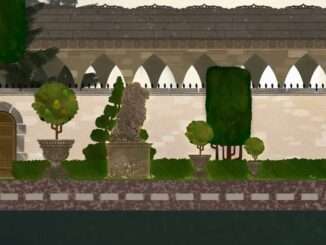
This guide describes the basic game loop of the game, and should help direct you in the correct direction if you’re stuck in the early game.
Contents
Guide to Get Unstuck
Сrеdit gоеs to Quilker!
Overview
Book of Hours is inscrutable at first, and you may be stuck after getting off the beach, or stuck once you’ve gotten to the house. This guide aims to give you a general (spoiler free) overview of the game’s basic mechanics, and should arm you with the necessary knowledge to unstuck yourself at any point.
Aspects
This is the core mechanic around the game – everything (important) in the game has an aspect, or multiple. There are thirteen total, listed below in alphabetical order:
- Edge
- Forge
- Grail
- Heart
- Knock
- Lantern
- Moon
- Moth
- Nectar
- Rose
- Scale
- Sky
- Winter
Most of the progression of the game revolves around getting “enough” of a certain aspect during crafting or reading.
Core Gameplay Mechanics – Soul, Skill, Memory
The core gameplay mechanic in this game revolves around getting enough of a certain aspect across three types of cards – soul, skill or memory. In crafting and in reading, you’ll need to combine one of each to get enough of an aspect to progress. For crafting, this is usually 5, 10 or 15 of a certain aspect. For reading, this is tied to the mystery level of the book.
Soul
These are the “elements of the soul” that you started out the game with. They’re in the second tab at the bottom of the UI. You should have 1-3 different types just from making it off the beach. There are nine types, and you’ll eventually unlock all of them by progressing on the tree of wisdom. You need to use them for basically everything you do during the day, which will fatigue them (but they’ll be restored at daybreak).
Take note that each soul has different aspects. Some actions are picky about which aspects it accepts, some aren’t, so you should save certain souls if you know you’ll need that aspect for later in the day.
You’ll be able to combine souls of the same type later on when you evolve your workbenches, which increases their aspect.
Skill
These are on the third tab at the bottom of the UI. Upon drying out and reading the journal, you should have unlocked two of these. There are a lot of different types of these, and you’ll use them to progress on the tree of wisdom.
Each skill also has different aspects! You can level up skills using “Consider” and selecting at least 1 lesson and 1 memory with matching aspects (the lesson does not have to be identical, and the lesson and memory do not need to match each other, just the skill).
Memory
Memories are the last, and sometimes the hardest part to acquire (at least during the early game) of the triad. You’ll get memories from many different actions, but many actions aren’t easily repeatable and memories disappear at the end of the day, so that isn’t a particularly practical way of progressing. You also get a weather card at the beginning of every day which can act as a memory.
Memories also have different aspects!
Typically the easiest way to gain memories of a desired aspect is to re-read a book. The same book will always give you the same memory if you re-read it. You can note down what memory the book gave you or you can refer to other guides to find out which books give what memory.
Gameplay Loop – Explore, Read, Craft, Improve
There are four-ish general different things you can do to progress in the game, with each one feeding into the others. In the early game, should you get stuck, usually it’s because you haven’t fully progressed along or discovered one of these axes.
Explore
This is the very first thing you should be doing in the early game. Unlock as many rooms as possible, as quickly as possible. To unlock a room, you’ll need an assistant with a corresponding amount of aspect. Unlocking rooms should be straightforward until you get to rooms that need 6 or more of a certain aspect.
Unlocking rooms requires assistance, which you can get from town – either from your friends or from the pub. Check other guides for more info on exactly which assistance gives you which aspect. Then, talk to them with a memory or a soul to imbue them with the aspects from that memory or soul. They can accept up to one of each.
“Basic” assistance from around town usually only has aspects of level 1-2, while Unusual assistance from the pub usually has 3 aspects of level 4. You can get unusual assistance by providing soul and money. You’ll typically need to pay for assistance. If you need more money, you can wait till the end of the year for your annual allowance, or work at the pub (provide just soul).
Exploring rooms gives you access to
Items in the room – such as furniture, inks, plants. You can use these in other crafts
Uncatalogued books
Workstations – depending on the type, these have various uses. Although they all allow you to craft things. Beds are a subtype of workstation that allow you to cure maladies. Desks are another sub type that allow you to read and write.
More unexplored rooms
Read
In the early game, this is the other 50% of what you will be doing other than exploring. To read a book, you have to first catalog it, which can be done with any soul (provided it matches the workstation). Cataloging can be done at any desk or with “Consider”. You can do this with multiple desks concurrently.
Reading books involves combining one each of soul, skill and memory to match the amount of mystery aspect that the book requires. For books with mystery 4, this should be straightforward, as most skills or souls will have 1 or 2 of the aspect required, then just wait for a day with the correct memory or weather to unlock the book. As you progress, you’ll build up a catalog of memories that you can regain by re-reading a book.
Reading gives you lessons (only the first time you read a book) and memories. You can consider the lesson to turn it into a skill if you don’t have it yet. If you already have that skill, you can use the lesson as part of levelling up another skill.
You should try to read all the books of mystery 4 first and get a wide range of skills. Then move on to mystery 6.
Craft
I don’t quite know enough about crafting yet. What I can tell so far is that what you craft is tied to what skill you use. If you use the same skill but different soul or memory or other items to reach the aspect level required, you’ll always get the same thing.
Crafting can give you memories or other items at higher skill levels.
Improve
Once you get into the hang of reading, you can use the skills and lessons unlocked to progress through the tree of wisdom, and level up your skills. You can then use those committed skills and specific workstations to evolve your soul. With these powered up skills and souls, you can then read higher mystery books, which give you stronger memories. This is the core gameplay loop of Book of Hours.





Hire an Assistant (your friend works for free!) and Talk to them, leaving the slot empty, to get a random Memory (from a pool specific to that Assistant, though there’s some overlap between them). In the early game, this is a great way to progress – go pick up your friend and just chat with them repeatedly until you get something you can use.
It’s probably worth adding a section explaining the importance of aspects (for items, cards, and slots) and how to see them. I’ve seen some folks get tripped up by not paying close attention to those. Likewise, looking at the verb description after adding stuff to slots to see what your options are, what else you could add/move around to get different results, what result you’ll get if you start the verb now… there’s a hefty difference between cooking an egg and hatching it, as well as things that you can Consider to get info vs things that are consumed when you Consider them!
Don’t forget that if you use a desk, you can slot an Ink or Tool into that last slot! You don’t have to rely just on soul/skill/memory to decipher your mysterious books. You probably should be judicious with using Inks that you can’t craft, but the Tools you find in the House are infinitely reusable. (Tools you craft generally are not, but you crafted them, so you can craft them again.)
* Not every skill has a craft for each principle at each tier. Some skills have no Scholar craft for one or both principles, for example.
* Many recipes can use different skills, though some recipes are specific to a single skill.
* Some workstations change recipes to give a different result (though doing that recipe at that workstation will always give that result). Some skills have a craft at a tier that can only be done at a specific workstation. Instruments often give song memories instead of other products, for example.
Crafting cares about what skill you use, which principle of that skill you use, whether you get it to 5, 10, or 15, and a few other things.
* ‘prentice level recipes (intensity 5) are straightforward – skill + 5 intensity of the given principle = product, consistently.
* Scholar level recipes (intensity 10) add a wrinkle – in addition to the skill and intensity 10 principle, you also need to use an item with another specific aspect (Leaf, or Pigment, or Remains, etc.) in order to do the craft. If you don’t, then you just get the ‘prentice result.
* Intensity 15 (I forget the name) requires not just an item with a specific aspect; it requires a specific item , often the Scholar level product.
NItpick: The 13 Principles are Principles. All the little icons on cards/objects/slots are Aspects, including the 13 Principles, but also stuff like “Thing” and “Memory” and “Made of Wood” and “Co-operative”.